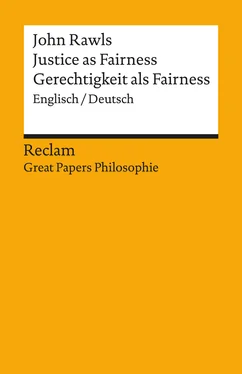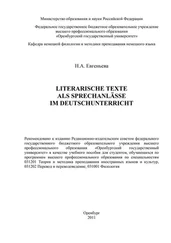Now the acknowledgment of this constraint in particular cases, which is manifested in acting fairly or wishing to make amends, feeling ashamed, and the like, when one has evaded it, is one of the forms of conduct by which participants in a common practice exhibit their recognition of each other as persons with [182] similar interests and capacities. In the same way that, failing a special explanation, the criterion for the recognition of suffering is helping one who suffers, acknowledging the duty of fair play is a necessary part of the criterion for recognizing another as a person with similar interests and feelings as oneself.16 A [68]person who never under any circumstances showed a wish to help others in pain would show, at the same time, that he did not recognize that they were in pain; nor could he have any feelings of affection or friendship for anyone; for having these feelings implies, failing special circumstances, that he comes to their aid when they are suffering. Recognition that another is a person in pain shows itself in sympathetic action; this primitive natural response of compassion is one of those responses upon which the various forms of moral conduct are built.
Similarly, the acceptance of the duty of fair play by participants in a common practice is a reflection in each person of the recognition of the aspirations and interests of the others to be realized by their joint activity. Failing a special explanation, their acceptance of it is a necessary part of the criterion for their recognizing one another as persons with similar interests and capacities, as the conception of their relations in the general position supposes them to be. [70]Otherwise they would show no recognition of one another as persons with similar capacities and interests, and indeed, in some cases perhaps hypothetical, they would not recognize one another as persons at all, but as complicated objects involved in a complicated activity. To recognize another as a person one must respond to him and act towards him in certain ways; and these ways are intimately connected with the various prima facie duties. Acknowledging these duties in some degree, and [183] so having the elements of morality, is not a matter of choice, or of intuiting moral qualities, or a matter of the expression of feelings or attitudes (the three interpretations between which philosophical opinion frequently oscillates); it is simply the possession of one of the forms of conduct in which the recognition of others as persons is manifested.
These remarks are unhappily obscure. Their main purpose here, however, is to forestall, together with the remarks in Section 4, the misinterpretation that, on the view presented, the acceptance of justice and the acknowledgment of the duty of fair play depends in every day life solely on there being a de facto balance of forces between the parties. It would indeed be foolish to underestimate the importance of such a balance in securing justice; but it is not the only basis thereof. The recognition of one another as persons with similar interests and capacities engaged in a [72]common practice must, failing a special explanation, show itself in the acceptance of the principles of justice and the acknowledgment of the duty of fair play.
The conception at which we have arrived, then, is that the principles of justice may be thought of as arising once the constraints of having a morality are imposed upon rational and mutually self-interested parties who are related and situated in a special way. A practice is just if it is in accordance with the principles which all who participate in it might reasonably be expected to propose or to acknowledge before one another when they are similarly circumstanced and required to make a firm commitment in advance without knowledge of what will be their peculiar condition, and thus when it meets standards which the parties could accept as fair should occasion arise for them to debate its merits. Regarding the participants themselves, once persons knowingly engage in a practice which they acknowledge to be fair and accept the benefits of doing so, they are bound by the duty of fair play to follow the rules when it comes their turn to do so, and this implies a limitation on their pursuit of self-interest in particular cases.
Now one consequence of this conception is that, where it applies, there is no moral value in the satisfaction of a claim incompatible with it. Such a claim violates the [74]conditions of [184] reciprocity and community amongst persons, and he who presses it, not being willing to acknowledge it when pressed by another, has no grounds for complaint when it is denied; whereas he against whom it is pressed can complain. As it cannot be mutually acknowledged it is a resort to coercion; granting the claim is possible only if one party can compel acceptance of what the other will not admit. But it makes no sense to concede claims the denial of which cannot be complained of in preference to claims the denial of which can be objected to. Thus in deciding on the justice of a practice it is not enough to ascertain that it answers to wants and interests in the fullest and most effective manner. For if any of these conflict with justice, they should not be counted, as their satisfaction is no reason at all for having a practice. It would be irrelevant to say, even if true, that it resulted in the greatest satisfaction of desire. In tallying up the merits of a practice one must toss out the satisfaction of interests the claims of which are incompatible with the principles of justice.
6. The discussion so far has been excessively abstract. While this is perhaps unavoidable, I should now like to [76]bring out some of the features of the conception of justice as fairness by comparing it with the conception of justice in classical utilitarianism as represented by Bentham and Sidgwick, and its counterpart in welfare economics. This conception assimilates justice to benevolence and the latter in turn to the most efficient design of institutions to promote the general welfare. Justice is a kind of efficiency.17 [185]
[78]Now it is said occasionally that this form of utilitarianism puts no restrictions on what might be a just assignment of rights and duties in that there might be circumstances which, on utilitarian grounds, would justify institutions highly offensive to our ordinary sense of justice. But the classical utilitarian conception is not totally unprepared for this objection. Beginning with the notion that the general happiness can be represented by a social utility function consisting of a sum of individual utility functions with identical weights (this being the meaning of the maxim that each counts for one and no more than one),18 it is commonly assumed that the utility functions of individuals are similar in all essential respects. Differences between [80]individuals are ascribed to accidents of education and upbringing, and they should not be taken into account. This assumption, coupled with that of diminishing marginal utility, results in a prima facie case for equality, e.g., of equality in the distribution of income during any given period of time, laying aside indirect effects on the future. But even if utilitarianism is interpreted as having such restrictions built into the utility function, and even if it is supposed that these restrictions have in practice much the same result as the application of the principles of justice (and appear, perhaps, to be ways of expressing these principles in the language of mathematics and psychology), the fundamental idea is very different from the conception of justice as fairness. For one thing, [186] that the principles of justice should be accepted is interpreted as the contingent result of a higher order administrative decision. The form of this decision is regarded as being similar to that of an entrepreneur deciding how much to produce of this or that commodity in view of its marginal revenue, or to that of someone distributing goods to needy persons according to the relative urgency of their wants. The choice between practices is thought of as being made on the basis of the allocation of benefits and burdens to individuals (these being measured by the present capitalized value of their utility over the full [82]period of the practice’s existence), which results from the distribution of rights and duties established by a practice.
Читать дальше












